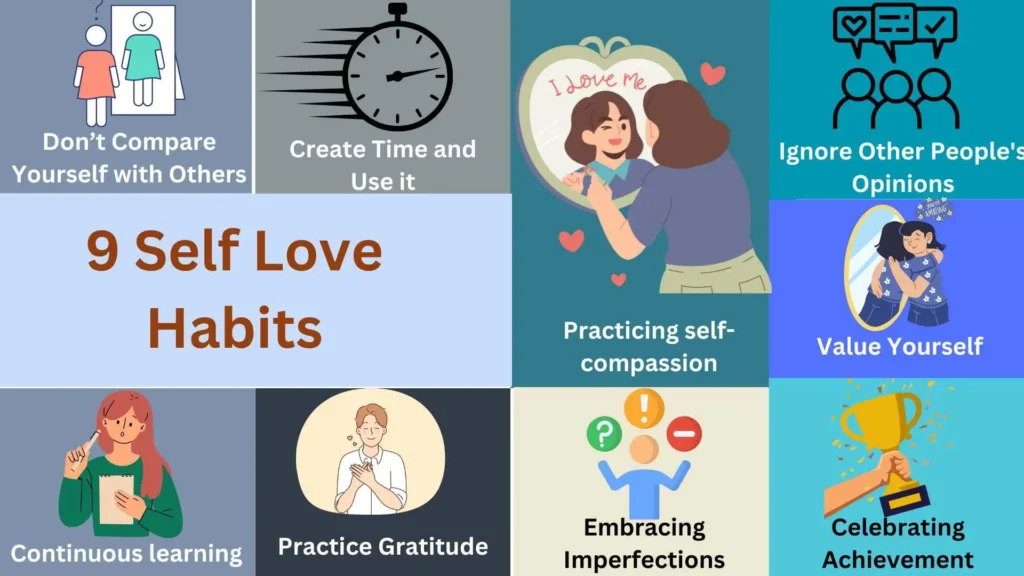“To love oneself is the beginning of a life-long romance.” What are your thoughts after reading this lovely quote from Oscar Wilde?
Self-love habits are the foundation of a happy and fulfilling life. It is an inner love and acceptance of who you are and how you are.
Maybe you think of self-love habits as narcissistic behavior, or whatever thoughts come to mind reflects your attitude toward yourself and self-love.
In this article, I will explore what self-love is. And what are the nine self-love habits that will empower you to live a fulfilling life?
Table of Contents
What is Self-Love?
Self-love is an appreciation and acceptance of all that makes you who you are. It is the commitment to one’s mental, physical, or emotional well-being.
It’s about prioritizing your well-being and happiness, knowing you deserve to live a life filled with joy and fulfillment. It’s the art of being your best friend and supporter in a world that sometimes feels too busy to notice your needs.
Self-love isn’t about being selfish or arrogant. It’s about recognizing your worthiness and embracing your flaws and imperfections with open arms. It is about establishing healthy boundaries and saying no when necessary, even if it means disappointing others.
Imagine waking up in the morning, and instead of immediately jumping into the day’s chaos, you take a moment to appreciate yourself. You look in the mirror and say, Hey, you’ve got this. You are awesome, and you are blessed. That’s self-love in action.
So, what is self-love? It’s the most beautiful and powerful love affair you’ll ever have with yourself.
No two people have the same love routine, but some common self-love habits positively impact everyone who has practiced them.
9 Important Self-love Habits
These are the self-love habits that changed my life.

1. Don’t Compare Yourself with Others
Not comparing yourself with others is a fundamental self-love habit that arises from recognizing and accepting your unique journey and worth.
You might argue that humans are inherently competitive; it is true, but it can be too dangerous. Why? When we compare ourselves with others, We frequently get into the trap of judging our self-worth solely on external qualities such as achievements, attractiveness, or possessions.
This can lead to emotions of inadequacy, jealousy, and self-doubt, damaging our sense of self-worth and acceptability.
By avoiding comparing ourselves to others, we shift our focus inward and embrace individuality. You become a happy person when you don’t compare yourself with others.
Research has shown that self-acceptance is the key to a happy and fulfilling life. This allows us to appreciate our strengths, accept our limitations, and celebrate our successes without needing validation from external sources.
2. Create U Time and Use it
It is one of the powerful self-love habits that emphasizes prioritizing oneself and making time for personal development. Creating U time means creating time in your schedule for self-care and growth.
You can create U time in many ways:
- Scheduling frequent breaks throughout the day
- Reserving particular time for hobbies or leisure activities
- Even setting off full days for rest and refreshment.
Once you have created U time, the next step is to use it intentionally and purposefully. This means engaging in activities that nourish your body, mind, and soul. It will bring you joy and fulfillment.
You can allocate some good time to practicing mindfulness, exercising, reading, journaling, or simply spending quality time alone. Also, you can engage yourself in building exercise habits.
By consistently creating U time and using it effectively, you see the idea of engaging in activities that increase your energy and improve your overall well-being.
This habit of self-love not only improves our overall well-being but strengthens our relationship with ourselves, bringing a more profound sense of self-acceptance and inner peace.
3. Practicing self-compassion
This is a foundational self-love habit. It is being gentle, accepting, and understanding to oneself, especially when things are hard.
When you practice self-compassion, you cultivate a supportive inner dialogue characterized by words of encouragement, reassurance, motivation, and comfort.
Rather than engaging in self-criticism or harsh self-judgment when things don’t go as planned, you respond with gentleness and understanding, accepting your inherent worth and fallibility.
Moreover, practicing self-compassion involves embracing your imperfections and vulnerabilities with openness and compassion. Instead of striving for perfection, comparing or tying yourself to unrealistic standards, you recognize that you are worthy of love.
This mindset shift allows you to approach yourself with extraordinary kindness and forgiveness, creating a more profound sense of self-love and acceptance.
4. Ignore Other People’s Opinions
Ignoring other people’s opinions is one of the good self-love habits that involves prioritizing your beliefs, decisions, values, and desires over the judgments or expectations of others.
People will always have opinions. They will always have something to say about you, whether you do good or bad. Don’t worry about what others think or expect of you. You can’t make everybody happy.
When you ignore other people’s opinions, you free yourself from the burden of seeking external validation and approval. It allows you to cultivate a greater sense of self-confidence and self-assurance.
When you trust your judgment and inner wisdom, you become less susceptible to the influence of others’ opinions or criticism.
5. Value Yourself Beyond Appearance
This is one of the fundamental self-love habits. It builds a strong sense of self-worth and appreciation for the unique qualities, talents, and characteristics that make you who you are.
It is a powerful truth that you are valuable not because of your body but because you are “You.” So wear what makes you happy. Wear what makes you feel confident, comfortable, and joyful, no matter how much or little you have.
When you value yourself beyond appearance, you shift your focus from external standards of beauty or attractiveness to the qualities that truly define you as an individual. This includes your intelligence, kindness, creativity, compassion, and countless other attributes contributing to your identity and sense of self.
Moreover, not valuing yourself can lead you to other worst habits for your mental health.
6. Learn Continuously
Learn, learn, and learn. It is one of those things that never stops. Try new things, read, learn, and explore. Learn from your mistakes, and do not repeat them.
It is an incredible self-love habit focusing on personal growth, development, and lifelong learning as essential components of self-care and self-improvement. When you commit to learning continuously, you invest in your well-being and fulfillment by seeking intellectual, emotional, and spiritual growth opportunities.
You can practice this habit of self-love in various forms, such as reading books, attending workshops, taking courses, listening to podcasts, or engaging in meaningful conversations with others.
Furthermore, continuous learning allows you to develop a more profound sense of self-awareness and self-discovery. You gain insights into your strengths, limitations, values, and goals as you explore new subjects, interests, and passions. It allows you to make educated decisions and pursue pathways true to your authentic self.
7. Practice Gratitude
Practicing gratitude is a profound self-love habit that develops a mindset of appreciation, thankfulness, and recognition for the blessings and abundance in our lives.
It is one of the best habits to adopt for a better life. When you practice gratitude, you shift your perspective from scarcity to abundance, from negativity to positivity.
Instead of focusing on what you lack or what’s going wrong, you train yourself to notice the blessings and moments of beauty surrounding you each day.
Practicing gratitude develops emotional well-being. A study of 70 research, including responses from over 26,000 people, indicated a link between higher levels of thankfulness and lower levels of depression.
Thankfulness promotes a strong sense of self-love and acceptance. Recognizing and appreciating the excellence inside yourself and your life confirms your intrinsic worth and value.
Be grateful for everything you have. There is no incorrect way to express gratitude. You may discover that you have more in life than you believe.
8. Embracing Imperfections
Embracing imperfections is a core aspect of practicing self-love habits. It means accepting and appreciating your flaws, mistakes, and vulnerabilities as integral parts of yourself.
In “An Essay on Criticism,” Alexander Pop says, “To err is human, to forgive is divine.” This quote means that imperfections are an inherent part of the human experience. Don’t worry about mistakes; make mistakes and learn from them.
When you embrace imperfections as part of your self-love habits, you admit that perfection is neither attainable nor necessary for your worthiness.
Instead of viewing imperfections as failures, recognize them as opportunities for growth and self-discovery. This mindset will allow you to approach life with greater compassion and acceptance towards yourself and others.
Celebrate your imperfections as part of what makes you unique and human.
9. Celebrating Achievement
No matter how big or small, achievements deserve to be celebrated. Reward yourself for every single milestone. It will help you stay motivated and be pleased with yourself.
By taking the time to celebrate your accomplishments, you trust your abilities and talents, supporting a positive self-image and increasing your self-esteem.
Celebrating achievements as a self-love habit cultivates a mindset of gratitude and appreciation for yourself. It encourages you to acknowledge the hard work and dedication to reaching your goals, building a sense of self-compassion.
For example, celebrating achievements for trying to stop coughing habits allows you to experience joy and satisfaction in your accomplishments, enhancing your overall well-being and happiness.
Conclusion
Remember, self-love does not happen overnight; it is a lifelong commitment to caring for our mind, body, and spirit.
Self-love habits include many actions that work together to improve our well-being and build a more profound sense of self-compassion, acceptance, and fulfillment.
From not comparing yourself with others to celebrating achievements, each habit is a step toward developing a more loving and caring connection with ourselves.
By bringing these self-love habits into your everyday lives, you can begin a transforming journey of growth and inner peace.




